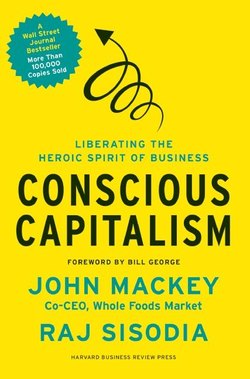Читать книгу Conscious Capitalism - John Mackey - Страница 9
На сайте Литреса книга снята с продажи.
ОглавлениеPART ONE
THE FIRST TENET
Higher Purpose
What are the two most important days of your life? Author Richard Leider asks this question of every audience he addresses. The first one is obvious: the day you were born. But the second is not so obvious. It is not the day you die; that is the end of the story, not a high point. It is not the day you graduate, get married, or have your first child—all significant milestones, of course, but not life defining for most. Richard’s answer: it is the day you realize why you were born.
Not everyone experiences that day; many of us don’t even know to ask the question. But for those who do, that day becomes a major fulcrum in their lives. Nothing is ever the same once you discover your true purpose, your calling. The complexion of daily life and of work changes. You are able to draw on reservoirs of energy and inspiration that you did not even know existed within you. Work becomes truly fulfilling, a source of satisfaction and joy.
One of the most successful books ever published is The Purpose Driven Life, by Arizona pastor Rick Warren. Since its publication in 2002, the book has sold tens of millions of copies. It has caught on in such a big way because it touched something very profound in people, a spiritual yearning and hunger for meaning and purpose in their lives. Meaning and purpose have always mattered to people, but they have taken on more urgent resonance with a growing proportion of us in the present times and will continue to grow in importance as society ages and we collectively become more conscious.
For companies, purpose matters because it energizes them and allows them to transcend the parochial concerns of individual stakeholders. When all stakeholders are aligned around a common higher purpose, they are less likely to care only about their immediate, narrowly defined self-interest. Having a higher purpose is the starting point of what it means to be a conscious business: being self-aware, recognizing what makes the company truly unique, and discovering how the company can best serve. Having a compelling purpose can also galvanize a company to strive for greatness. As Jeff Bezos, founder and CEO of Amazon.com, says, “Choose a mission that is bigger than the company. The founder of Sony sets the mission for the company that they were going to make Japan known for quality.”1
Walter Robb, co-CEO of Whole Foods Market, speaks eloquently of our company’s purpose: “We are not so much retailers with a mission as missionaries who retail. The stores are our canvas upon which we can paint our deeper purpose of bringing whole foods and greater health to the world.”
Core values constitute the guiding principles the business uses to realize its purpose. Whole Foods Market’s core values succinctly express the purposes of the business—purposes that include making profits but also creating value for all of the major constituencies. Our business talks and walks our values; we share them with our constituency groups and invite feedback in the form of dialogs. The core values are these: selling the highest-quality natural and organic products available, satisfying and delighting our customers, supporting team member happiness and excellence, creating wealth through profits and growth, caring about our communities and the environment, creating ongoing win-win partnerships with our suppliers, and promoting the health of our stakeholders through healthy eating education.
